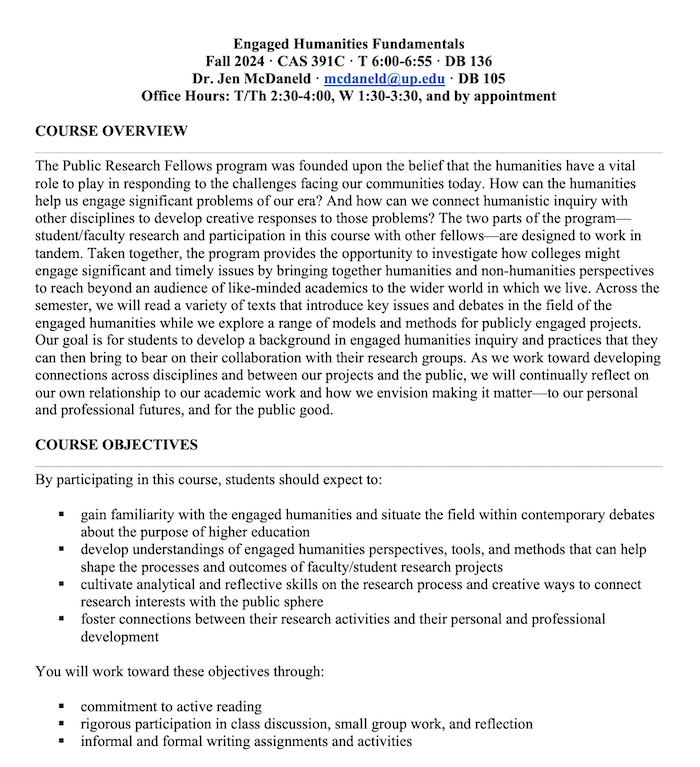How the Program Works
For Faculty:
Participating as a faculty fellow in the program is a great way to gain experience in public-facing undergraduate research in a supported environment alongside an interdisciplinary cohort. Here’s how it works:
Faculty can apply individually or in pairs to one of two tracks:
Undergraduate research project: for this track, faculty partner with 2-5 students to develop research projects on a topic or issue related to the local community (or an annual theme). The project must result in a public-facing outcome of some kind, rather than an academic essay or conference presentation. Examples of public-facing research outcomes include (but are not limited to):
- creative, interactive, and/or practical interventions (exhibits, curated spaces, prototypes, organizational plans, etc.)
- community engagements with local institutions or organizations
- podcasts, social media campaigns, online tools, or other digital humanities ventures
- curated interdisciplinary events (speaker series, performances, workshops, etc.).
Curriculum development project: for this track, faculty partner with 2-5 students to develop curricular projects on a topic or issue related to the local community (or an annual theme). Examples of such curricular projects include (but are not limited to):
- the development of new team-taught Core Exploration-level “big ideas” courses
- the creation of course modules and/or assignments that connect with local communities
- other curricular innovations that engage pedagogy with the public, the city of Portland and/or local neighborhoods.
Other details:
- Faculty fellows participate both semesters and earn a $2500 stipend
- All faculty from across UP are eligible to apply to be a fellow
- Faculty need not have identified students to work with to apply to the program; once the project is accepted, the program can help with student recruitment.
For Students:
What do Student Fellows do?
- Take 2 1-credit reading courses: CAS 391: “Engaged Humanities Fundamentals” in the fall and CAS 391: "Engaged Humanities Futures" in the spring (the courses change a bit each year, but see below for sample syllabi from previous years). The "Fundamentals" course provides background and tools in engaged humanities methods that will help students translate undergraduate research to wider publics and the "Futures" course helps students connect their academic work with their personal and professional goals after college using humanities mindsets and skills.
- Enroll in one research credit per term with the faculty fellow organizing your project and participate in regular meetings with your project team (at least once every two weeks); help develop the project and conduct research under faculty guidance
- Participate in a handful of program meetings and events with faculty and student fellows across the year
What’s in it for Student Fellows?
- 4 credits total (1 credit for "Engaged Humanities Fundamentals" in fall; 1 credit for Engaged Humanities Futures in spring; 1 credit each in fall and spring for Undergraduate Research; together these can add up to an elective course toward your degree)
- Experience in undergraduate research and working closely with faculty
- The chance to collaborate with a close-knit, dedicated group of students from a variety of disciplines
- The opportunity to help shape the program and the conversation around engaged humanities at UP
Other details:
- recruitment for projects usually begins in the late spring; be on the look out for a call from the program during this window

Engaged Humanities Fundamentals and Futures
The Public Research Fellows program was founded upon the belief that the humanities have a vital role to play in responding to the challenges facing our communities today. How can the humanities engage significant issues of our era and in our communities? And how can we connect humanistic inquiry with other disciplines to develop creative responses to those issues?
The fall reading course (Engaged Humanities Fundamentals) explores these questions by bringing the student fellow cohort together over a variety of texts that introduce key issues, debates, and models in the field of the publicly-engaged humanities. The goal is for students to develop a background in engaged humanities inquiry and tools that they can then bring to bear on their collaboration with their research groups.
The spring reading course (Engaged Humanities Futures) shifts to explore how engaged humanities mindsets and practices can help students develop their own unique personal and professional paths after graduation.
Download a sample Fundamentals syllabus
